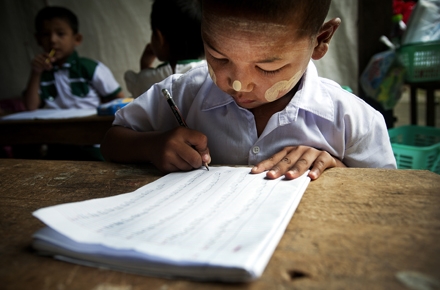Myanmar's academic ambitions
Education has the power to reinvigorate Burmese society, writes Pyone Myat Thu.
Later this week, noble peace prize laureate and head of the National League for Democracy, Daw Aung San Suu Kyi will travel to Canberra where she will receive an honorary doctorate at The Australian National University.
Her trip to Australia and further afield is a poignant reminder of the significant political reforms taking place in the country of my birth, Myanmar.
Watching the rapid transformation of our homeland with a degree of scepticism, members of the Burmese diaspora are nevertheless filled with more hope than ever before.
Earlier experiences have taught us not to hold great expectations. Whenever there were signs of progress they were soon followed by disappointment and delay.
Coming from a family of academics, my parents, uncles and aunts left Myanmar in the 1980s in desperation; not to escape political persecution but to overcome low government wages and rising costs of living. The idea of return has always been close to their hearts but they kept extending their time abroad because the situation back home was unfavourable to making a viable living or to giving their children a good education.
Following the nation-wide student uprisings in August 1988, schools, technical colleges and tertiary institutions were closed over the subsequent years, and the education sector overall has been neglected for as long as anyone cares to remember.
There is a need to improve standards of basic education, and to make education more inclusive of Myanmar’s diverse ethnic groups. In addition, there is a shortage of teachers, limited teacher training and instructional materials, poor infrastructure, lack of funds and big obstacles to academic freedom. Myanmar's tertiary institutions, faculties, and colleges are administered under different ministries, and campuses are scattered to prevent student protest movements.
In June 2013, a milestone was achieved with the semi-civilian Myanmar government initiating the revitalisation of the education system.
Daw Suu leads the Parliament’s Higher Education Law Committee in drafting the higher education bill. She sees the overall process as being more than the modernisation of the education sector, but a means to 'reinvigorate our society'.
These encouraging steps raise important questions on how overseas Burmese academics might engage with the homeland, and what can be done to promote and involve the skilled Burmese diaspora to achieve broader development goals in Myanmar.
From a regional perspective, we can also ask what roles Australian universities, academics, and students play to bring about positive change in Myanmar’s education sector.
At ANU there are currently around a dozen Myanmar undergraduate and postgraduate students. The majority of students are on Australian government scholarship - with the first in-take arriving in 2011. There are well over 40 academics with Myanmar-related research, making ANU home to the largest concentration of Myanmar expertise in the Southern hemisphere.
The University holds the Burma/Myanmar Update every 18 months, which brings together state actors, researchers, and civil society to examine the most pressing issues facing Myanmar.
Recently, ANU and the University of Yangon signed a revised memorandum of understanding (the first MOU was signed in 2003). This renewed engagement will see ANU contribute to the development of Yangon University in key scientific and policy areas.
It opens up numerous opportunities for collaboration, mentoring and knowledge exchanges between staff and students in the universities. Such nascent bilateral linkages can potentially extend across to other Myanmar universities, research institutions, civil society organisations, and through informal channels.
In the last couple of years increasing numbers of overseas Burmese have returned to Myanmar to contribute to change.
Some have returned for political reasons, others on more personal and moral grounds. For those of us in the diaspora who are contemplating return, we should consider what kind of contributions we can make, why we want to make these, and how might these be best achieved.
Finally, for those who wish to remain abroad, there are ways to contribute from afar, through short-term consultancy, volunteer work, and advocacy.
Indeed, Myanmar has much to gain either way by harnessing the skills, experiences and resources offered by the skilled and educated Burmese diaspora. For those of us in the diaspora there is no better time than now to contribute to the country we once called home. The country we all would like to see prosper as we know it can.
Dr Pyone Myat Thu is a postdoctoral research fellow in the State, Society and Governance in Melanesia program, School of International, Political and Strategic Studies, ANU College of Asia and the Pacific.
Daw Aung San Suu Kyi will receive an honorary doctorate from ANU at 11am this Friday.







